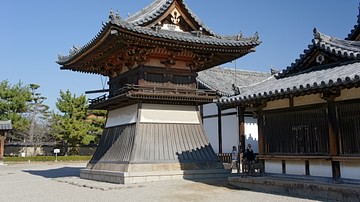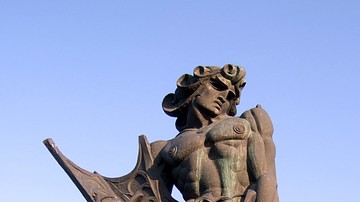Search
Search Results

Definition
Greek Mythology
Greek mythology was used as a means to explain the environment in which humankind lived, the natural phenomena they witnessed and the passing of time through the days, months, and seasons. Greek myths were also intricately connected to religion...

Definition
Kojiki - Japan's Oldest Book
The Kojiki ('Record of Ancient Things') is the oldest book of Japanese history and the oldest text of any kind from Japan. Compiled in 712 CE by the court scholar Ono Yasumaro, the work begins with the gods and the creation of the world...

Article
Life in a Japanese Buddhist Monastery
Buddhist monasteries have been part of the Japanese cultural landscape ever since the 7th century CE, and they remained both powerful and socially important institutions right through the medieval period. Today, many of Japan's finest examples...

Article
Ancient Japanese & Chinese Relations
Relations between ancient Japan and China have a long history, and in certain periods the exchange of political, religious and cultural practices between the two was intense. China, the much older state and the more developed, passed on to...

Definition
Ancient Persian Mythology
The mythology of ancient Persia originally developed in the region known as Greater Iran (the Caucasus, Central Asia, South Asia, and West Asia). The Persians were initially part of a migratory people who referred to themselves as Aryan...

Definition
Ancient Egyptian Mythology
Egyptian mythology was the belief structure and underlying form of ancient Egyptian culture from at least c. 4000 BCE (as evidenced by burial practices and tomb paintings) to 30 BCE with the death of Cleopatra VII, the last ruler of the Ptolemaic...

Article
Japanese Castles
Fortifications of one kind or another had been used in Japan since ancient times, but in the period from 1576 until 1639, a new and distinctive style of castle was constructed. Rather than being used for fighting, these were impressive structures...

Definition
Armenian Mythology
The mythology of ancient Armenia is a rich blend of indigenous traditions with imported ideas from neighbouring cultures and migrating peoples added over the centuries. The legends and stories helped to explain natural phenomena, provide...

Article
Ten Norse Mythology Facts You Need to Know
The stories that make up what is known today as Norse mythology once informed the religious beliefs of the people of regions including Scandinavia and Iceland. To the Norse, the world was an enchanted place of gods, spirits, and other entities...

Definition
Ancient Japan
Ancient Japan has made unique contributions to world culture which include the Shinto religion and its architecture, distinctive art objects such as haniwa figurines, the oldest pottery vessels in the world, the largest wooden buildings anywhere...